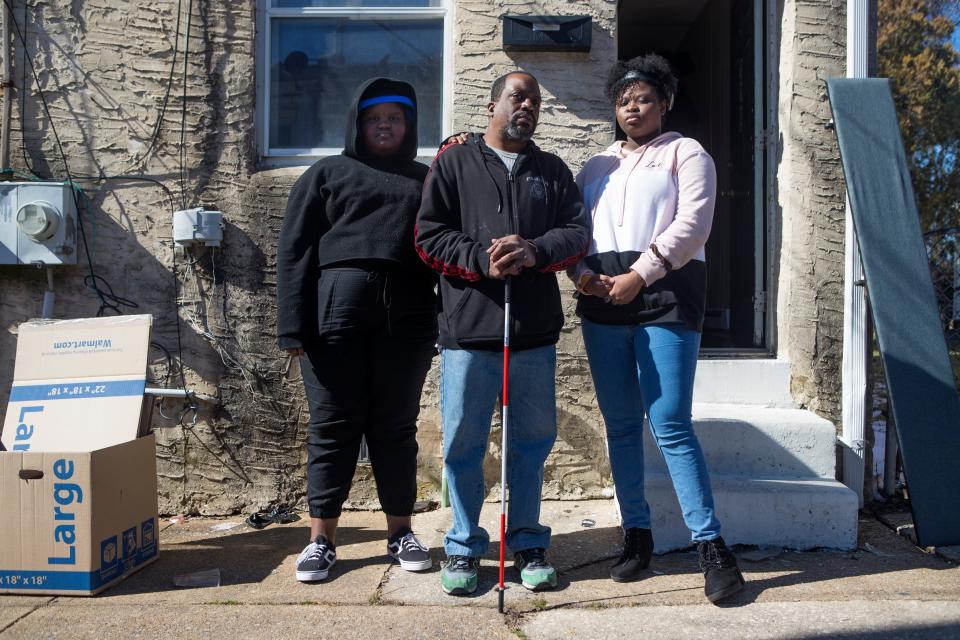2 years after this blind man was wrongly evicted, what's happening with suit, tenant bill?
EDITOR'S NOTE: A previous version of this story listed the incorrect time line of William Murphy's eviction.
A lot has happened since constables showed up at the Wilmington doorsteps of William Murphy two years ago this month with a notice to evict the blind man and his two daughters.
A federal lawsuit filed against the state and the landlord after the wrongful eviction is making its way through the court system. A federal judge recently denied a state's motion to remove the Delaware Justice of the Peace Court system, which facilitated Murphy's eviction, from the lawsuit.
And state lawmakers are again trying to amend the landlord-tenant code to provide legal representation to some people facing eviction to avoid wrongful evictions.
Murphy, along with his two daughters, moved to Salisbury, Maryland, for financial reasons, according to his attorney.

"He finds living in Maryland definitely more hospitable than living here in Wilmington, where they had to undergo the nightmare they lived through," said Thomas S. Neuberger, one of Murphy's attorneys.
The eviction that shouldn't have happened
Murphy and his two youngest daughters were forced from their Southbridge home on Feb. 11, 2021, when Justice of the Peace Court constables showed up at their Townsend Street door and presented eviction documents that named a previous tenant who was a woman.
Murphy showed constables his lease, which he later shared with Delaware Online/The News Journal. The lease, which ran from Nov. 15, 2020, through Nov. 30, 2021, was signed by the landlord, Kenneth Stanford and Murphy.
Murphy also provided the constable a copy of the social services assistance paperwork, dated Nov. 17, 2020, which highlighted funds for the initial rent. Stanford, however, told constables the Murphys were not supposed to be at the house and so the eviction was carried out.
The Murphys were forced to leave behind school laptops; an urn holding the ashes of Murphy's wife, who died in 2018; and several other belongings.
Deputy Chief Magistrate Sean McCormick said during an emergency hearing on Feb. 18, 2021, after Murphy filed wrongful eviction motions, that Stanford likely perjured himself in court filings and went so far as to read the landlord his rights against self-incrimination after he said he "misrepresented" the facts to the court.
Looking for justice in federal court
In March 2021, Murphy filed a federal lawsuit against his landlord and the Justice of the Peace Court system, Delaware's Justice of the Peace Chief Magistrate Alan Davis and three constables.
Lawsuit filed:Blind man wrongfully evicted from Wilmington home sues court system, landlord
The state argued the matter against the court system be dismissed, but according to Neuberger, U.S. District Chief Judge Colm F. Connolly denied their motion on Dec. 19.
"He asked us to refocus our case on violations of the federal Americans with Disabilities Act and to file an amended complaint based on the discovery we had so far," Neuberger told Delaware Online/The News Journal.
Murphy's attorneys did that by zeroing in on just the Justice of the Peace Court system's treatment of evictions of the blind and other disabled and violations of federal Americans with Disabilities Act requirements in handling such disability cases.
"We claim that there's an evict first, ask questions later policy," Neuberger said, explaining how despite finding concerns with the paperwork, constables were still ordered to evict Murphy and his two daughters. "That is so, so wrong."
Neuberger said they're seeking permanent supervision over the magistrate court system.
"We're going to ask this judge to issue an injunction of some sort making sure this doesn't happen again," he said.
Lawmakers reintroduce the eviction bill
As Murphy's case moves through federal court, Senate Majority Leader Sen. Bryan Townsend, D-Newark/Bear, recently introduced a bill that would give the right of free legal counsel to people whose income is no more than twice the federal poverty guideline, which is determined and updated by the U.S. Department of Health and Human Services.
(View Senate Bill 1 below.)
"We are hopeful that this year's version has made a couple changes in particular, it exempts small landlords," said Townsend, adding these would-be landlords who own three or fewer units. "Hopefully, that helps us get across the finish line."
Townsend introduced a similar bill two years ago that failed to pass in 2021 and 2022. The failure to support that initiative came from the House of Representatives. But unlike the previous attempts, Townsend said this time around Gov. John Carney included funding for this in his recommended budget.
Townsend's original bill:Why lawmakers want to protect people who may face eviction in Delaware
"Having something in the Governor's Recommended Budget (GRB) can be very, very helpful because it indicates the governor supports it," he said. "It can indicate it's a priority of the governor, priority that the Legislature that the governor is honoring. It can mean a few different things."
The cost for this is estimated to start at more than $1 million and go up to $3 million. The program would be administered by a legal aid organization that would hire attorneys and non-attorney advocates.
In addition to providing representation to certain impoverished tenants, the proposed legislation would also create a diversion program to resolve most landlord-tenant disputes before they result in legal action.
Townsend wanted to make clear the proposed legislation doesn't mean tenants who can't pay get to stay for free. "The idea of having an advocate in the process for the tenants to sort out whether it's a tenant who can find a way to pay or a tenant who does need to move along," he said. "The whole idea is that having an advocate in the process can lead to better outcomes for everybody."
Contact Esteban Parra at (302) 324-2299, eparra@delawareonline.com or Twitter @eparra3.
This article originally appeared on Delaware News Journal: Blind man's lawsuit against Delaware court system allowed to continue

